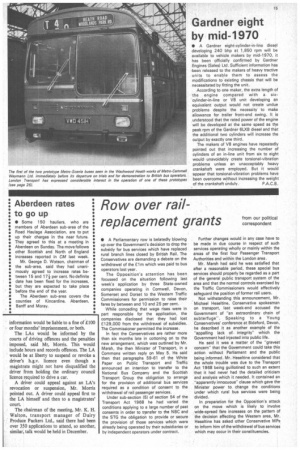Row over rail replacement grants
Page 17

If you've noticed an error in this article please click here to report it so we can fix it.
from our political correspondent
• A Parliamentary row is belatedly blowing up over the Government's decision to drop the subsidy for bus services which have replaced rural branch lines closed by British Rail. The Conservatives are demanding a debate on the withdrawal of the £1m which was paid to bus operators last year.
The Opposition's attention has been focussed on the situation following last week's application by three State-owned companies operating in Cornwall, Devon, Somerset and Dorset to the Western Traffic Commissioners for permission to raise their fares by between and 10 and 25 per cent.
While conceding that wage rises were in part responsible for the application, the companies disclosed that they had lost £129,000 from the withdrawal of subsidies. The Commissioner permitted the increase.
In fact the Conservatives are rather more than six months late in cottoning on to the new arrangement, which was outlined by Mr. Marsh, the then Minister of Transport, in a Commons written reply on May 5. He said then that paragraphs 59-61 of the White Paper on Public Transport and Traffic announced an intention to transfer to the National Bus Company and the Scottish Transport Group the obligation to arrange for the provision of additional bus services required as a condition of consent to the withdrawal of rail passenger services.
Under sub-section (5) of section 54 of the Transport Act 1968 he had varied the conditions applying to a large number of past consents in order to transfer to the NBC and the STG the obligation to provide or secure the provision of those services which were already being operated by their subsidiaries or by independent operators under contract. Further changes would in any case have to be made in due course in respect of such services operating wholly or mainly within the areas of the first four Passenger Transport Authorities and within the London area.
Mr. Marsh had said he was satisfied that after a reasonable period, these special bus services should properly be regarded as a part of the general public transport system of the area and that the normal controls exercised by the Traffic Commissioners would effectively safeguard the position of former rail users.
Not withstanding this announcement, Mr. Michael Heseltine, Conservative spokesman on transport, last week-end accused the Government of "an extraordinary chain of subterfuge-. Speaking to a Young Conservatives' conference at Bideford, Devon, he described it as another example of the "appalling lack of integrity" which the Government had injected into public life.
He said it was a matter of the "gravest concern" that the Government could take this action without Parliament and the public being informed. Mr. Heseltine considered that the whole trouble was due to the Transport Act 1968 being guillotined to such an extent that it had never had the detailed criticism and analysis which it needed. It contained an "apparently innocuous" clause which gave the Minister power to change the conditions under which rural bus services were being divided.
In preparation for the Opposition's attack on the move which is likely to involve wide-spread fare increases on the pattern of the decision affecting the Western area, Mr. Heseltine has asked other Conservative MPs to inform him of the withdrawal of bus services which may occur in their constituencies.




































































































